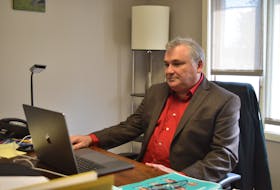Harry Smith’s dream is displayed proudly on his license plate.
“No gas” is spelled on the back of Smith’s Tesla Model S, a motto he’s lived by since buying the electric vehicle in 2012.
It’s also a prediction he hopes will describe an anticipated shift in the automotive industry.
“My wife and I spent a lot of time wasting resources and never even thought about it, I grew up in Texas in the middle of refineries,” said Smith, who educated participants during last month’s Earth Expo at the P.E.I. Farm Centre on the advantages of electric cars. “The sooner you start thinking about it, there’s no oil being made anywhere, we might find some more but sooner or later its going to be gone... its going to be catastrophic and civilization will change”
Summerside psychiatrist Chris Stewart also showed his electric car, a Nissan Leaf, at the expo.
His reason for buying the Leaf, the world’s best-selling highway-capable electric vehicle, was simple.
“To save the world,” said Stewart, noting that the comfortable hatchback is also deceivingly powerful.
“I’ll bet you there’s not five cars in this parking lot that could keep up with him (Stewart),” said Smith.
While many would likely be happy to drive guilt-free with zero emissions, previous concerns of the cars being under-powered as well as high initial costs have been the biggest barriers for electric vehicles.
Smith bought his first Tesla for about $100,000 in 2012 and has also spent a considerable amount having a 1996 Toyota Rav4 re-fitted with electric power.
With electric technology quickly advancing, as well as a diminishing price tag, Smith feels the trend towards zero-emission vehicles will continue to grow.
“In five to eight years, a lot of analysts believe it will be very difficult to buy a new gas-powered car from a dealership because the economics are just compelling,” he said.
The upcoming Tesla Model 3, which has a release date of 2017, is being looked at by many as an upcoming game-changer for the automotive industry.
Tesla’s website lists more than 325,000 reservations for the new car, which is boasting a price tag of $35 thousand.
“If you do a five-year ownership comparison with a gas car, taking into account fuel, repairs and servicing, it doesn’t make sense economically to buy the gas car,” said Smith, who charges his Tesla in a dryer plug at home.
A full charge allows Smith about 450 km of driving in the summer.
He said the availability of charging stations is greater than many realize, with about 25 located in P.E.I. and more than 25 thousand across North America.
“I drove to LA a couple of times, Florida and Vancouver. It was no problem,” said Smith.
Harry Smith’s dream is displayed proudly on his license plate.
“No gas” is spelled on the back of Smith’s Tesla Model S, a motto he’s lived by since buying the electric vehicle in 2012.
It’s also a prediction he hopes will describe an anticipated shift in the automotive industry.
“My wife and I spent a lot of time wasting resources and never even thought about it, I grew up in Texas in the middle of refineries,” said Smith, who educated participants during last month’s Earth Expo at the P.E.I. Farm Centre on the advantages of electric cars. “The sooner you start thinking about it, there’s no oil being made anywhere, we might find some more but sooner or later its going to be gone... its going to be catastrophic and civilization will change”
Summerside psychiatrist Chris Stewart also showed his electric car, a Nissan Leaf, at the expo.
His reason for buying the Leaf, the world’s best-selling highway-capable electric vehicle, was simple.
“To save the world,” said Stewart, noting that the comfortable hatchback is also deceivingly powerful.
“I’ll bet you there’s not five cars in this parking lot that could keep up with him (Stewart),” said Smith.
While many would likely be happy to drive guilt-free with zero emissions, previous concerns of the cars being under-powered as well as high initial costs have been the biggest barriers for electric vehicles.
Smith bought his first Tesla for about $100,000 in 2012 and has also spent a considerable amount having a 1996 Toyota Rav4 re-fitted with electric power.
With electric technology quickly advancing, as well as a diminishing price tag, Smith feels the trend towards zero-emission vehicles will continue to grow.
“In five to eight years, a lot of analysts believe it will be very difficult to buy a new gas-powered car from a dealership because the economics are just compelling,” he said.
The upcoming Tesla Model 3, which has a release date of 2017, is being looked at by many as an upcoming game-changer for the automotive industry.
Tesla’s website lists more than 325,000 reservations for the new car, which is boasting a price tag of $35 thousand.
“If you do a five-year ownership comparison with a gas car, taking into account fuel, repairs and servicing, it doesn’t make sense economically to buy the gas car,” said Smith, who charges his Tesla in a dryer plug at home.
A full charge allows Smith about 450 km of driving in the summer.
He said the availability of charging stations is greater than many realize, with about 25 located in P.E.I. and more than 25 thousand across North America.
“I drove to LA a couple of times, Florida and Vancouver. It was no problem,” said Smith.








